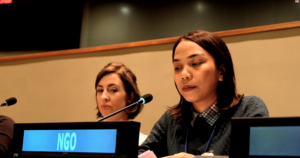Oral Statement presented by WGNRR at the 62nd Session of the Commission on the Status of Women (CSW) — March 2018
This statement was presented by Christelyn Sibugon on behalf of WGNRR. Click on the image and watch the video at 1:01:14
On behalf of the Women’s Global Network for Reproductive Rights, I value the opportunity to represent over a thousand organizations and individuals worldwide, who are committed to advancing sexual and reproductive health and rights for all.
Realizing women’s empowerment is rightly positioned as integral to sustainable development. Central to attaining rural women and girls’ empowerment is holistically ensuring their human rights throughout the life course.
Yet, rural women and girls who comprise 43% of the world’s agricultural labor force particularly farmers, agricultural workers, indigenous women, Dalit women, nomads, tribals, fisherfolks, informal women workers, and herders, are often made vulnerable via multiple and intersecting forms of discrimination and violence.
They continue to have limited access and control to land and productive assets; their work unpaid and unrecognized; and while they tend to the wellbeing of their families, their bodily autonomy is severely limited and their personal health remains at risk. They are threatened by displacement, land grabbing, armed conflict, militarization, religious fundamentalisms, and the impacts of climate change. Girls who live in poor and rural areas, and have limited access to education, are most at risk of early marriages. Harmful traditions such as female genital mutilation are still present and are done more commonly in rural communities, affecting an estimated 100 million to 140 million women and girls around the globe. Women and girls in rural areas face many challenges when trying to access sexual and reproductive health services such as: distance, costs, availability, familial obligations, lack of information, and cultural and religious norms that are tied to gender stereotypes. The unmet need for sexual and reproductive health information and services, including abortion services is highest among women and girls who are living in impoverished, rural and remote areas.. When health services are unreachable, rates of unsafe abortion, maternal mortality and morbidity substantially increase, impacting rural and women girls the most.
In light of these realities, I ask you: how can rendering rural women and girls invisible and subjecting them to multiple and intersecting forms of discrimination, be described as anything other than State condoned and perpetuated violence? It is therefore crucial that as part of a viable, balanced and rights-based approach to sustainable development and women’s empowerment, governments strengthen normative, legal, and policy frameworks by recognizing rural women and girls’ sexual and reproductive rights as central to the achievement of social, environmental, and economic justice. Anything less is careless and counter to governments’ human rights commitments.
Thank you.

